Enhancing elderly mental health support requires a balance of motivation and discipline. Motivation drives engagement in activities, while discipline ensures consistent routines. Key strategies include creating supportive environments, encouraging social connections, and promoting physical activity. Additionally, personalized routines and positive reinforcement can help instill discipline, leading to improved mental health outcomes for the elderly.
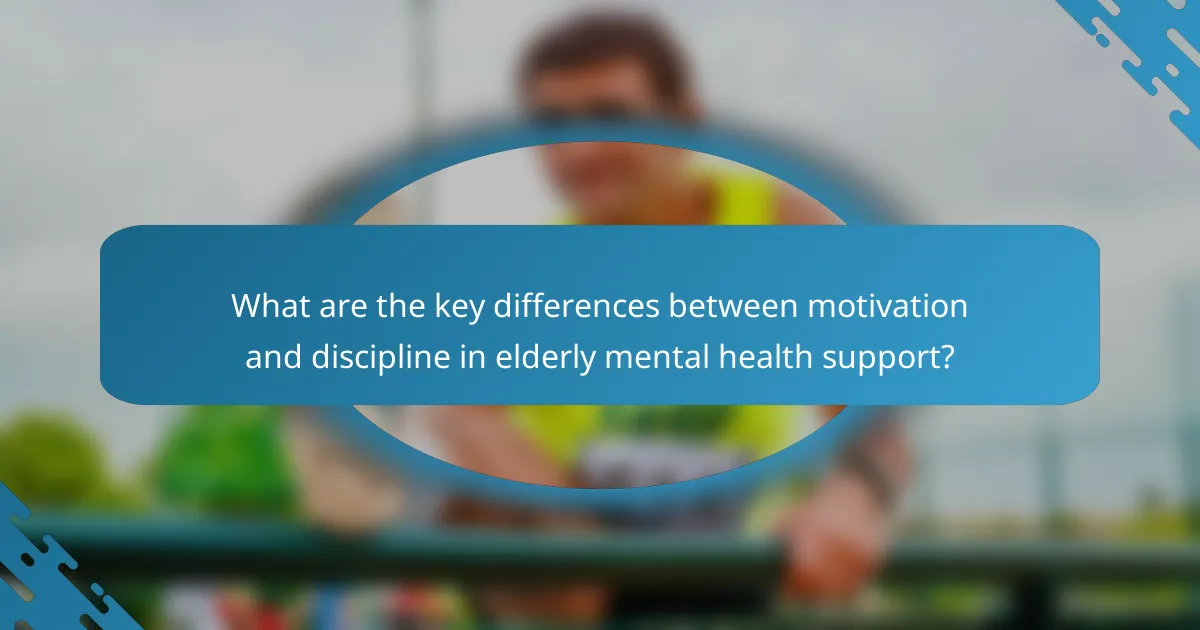
What are the key differences between motivation and discipline in elderly mental health support?
Motivation drives individuals to pursue goals, while discipline ensures consistent action toward those goals. In elderly mental health support, motivation fosters engagement in activities, enhancing emotional well-being. Discipline helps maintain routines, providing structure and stability, which are crucial for mental health. Both are essential; however, motivation can fluctuate, whereas discipline reinforces commitment. Balancing these elements can lead to improved mental health outcomes in elderly populations.
How does motivation impact mental health in the elderly?
Motivation significantly enhances mental health in the elderly by promoting engagement and purpose. Increased motivation leads to improved emotional well-being and cognitive function. Studies show that motivated seniors experience lower levels of depression and anxiety. Encouraging activities that align with their interests can foster a sense of accomplishment and social connection, vital for mental health.
What role does discipline play in maintaining mental well-being for seniors?
Discipline is crucial for maintaining mental well-being in seniors as it fosters routine and stability. Regular engagement in structured activities can enhance cognitive function and emotional health. Studies show that disciplined practices, such as exercise and social interaction, significantly reduce feelings of loneliness and depression. Additionally, establishing a daily schedule supports better sleep patterns and overall mood, contributing to enhanced quality of life for elderly individuals.
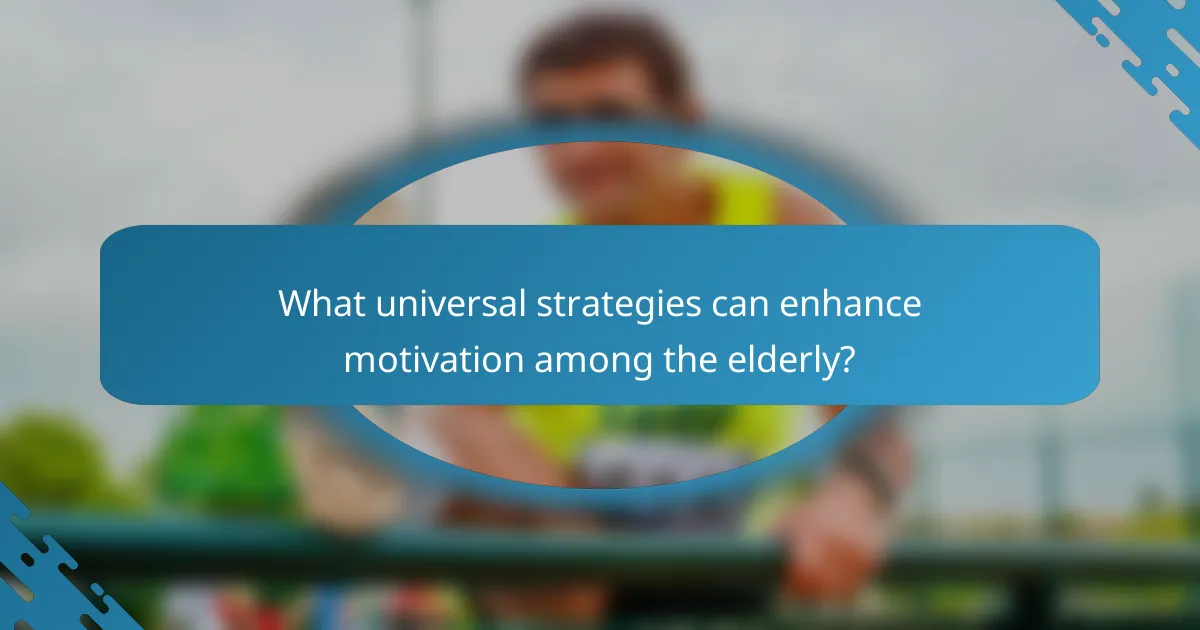
What universal strategies can enhance motivation among the elderly?
To enhance motivation among the elderly, focus on fostering a supportive environment, encouraging social connections, and promoting physical activity. These strategies can significantly improve mental health outcomes.
1. Create a supportive environment: Ensure access to resources and assistance, fostering a sense of security and belonging.
2. Encourage social connections: Facilitate group activities and interactions to combat loneliness and enhance engagement.
3. Promote physical activity: Incorporate regular exercise tailored to individual capabilities, boosting both physical and mental well-being.
Implementing these strategies can lead to lasting motivation and improved quality of life for the elderly.
Which activities promote intrinsic motivation in seniors?
Engaging in creative activities, social interactions, and physical exercises promotes intrinsic motivation in seniors. These activities enhance self-esteem and foster a sense of purpose. For example, art classes, group outings, and gardening can significantly boost mental well-being. Social connections play a unique role, as they encourage seniors to participate actively and enjoyably.
How can social interactions boost motivation levels?
Social interactions can significantly boost motivation levels among the elderly by fostering a sense of belonging and purpose. Engaging with peers enhances emotional support, which is crucial for mental health. Positive social experiences can lead to increased levels of dopamine, a neurotransmitter associated with motivation. As a result, elderly individuals who participate in group activities often report higher motivation to engage in daily tasks. Additionally, shared experiences can create accountability, encouraging individuals to pursue their goals actively.
What types of hobbies are most effective in fostering motivation?
Engaging in hobbies such as gardening, painting, or playing musical instruments effectively fosters motivation in the elderly. These activities stimulate creativity, enhance cognitive functions, and provide a sense of accomplishment. Research indicates that social hobbies, like group classes or clubs, further boost motivation by fostering connections and reducing feelings of isolation.

What unique approaches can be applied to instill discipline in elderly care?
To instill discipline in elderly care, incorporate personalized routines, positive reinforcement, and social engagement strategies. These approaches enhance motivation while ensuring adherence to care plans.
Personalized routines create structure, helping elderly individuals understand expectations. Positive reinforcement encourages desired behaviors, fostering a sense of accomplishment. Social engagement promotes accountability and reduces feelings of isolation, enhancing overall mental health.
How can structured routines improve mental health outcomes?
Structured routines significantly enhance mental health outcomes by providing stability and predictability. They foster a sense of control, which is crucial for elderly individuals facing cognitive decline. Research indicates that routines can reduce anxiety and improve mood by creating a familiar environment. Additionally, engaging in regular activities promotes social interaction, further supporting emotional well-being. Establishing these routines can lead to a marked improvement in overall mental health for the elderly population.
What role does goal-setting play in enhancing discipline?
Goal-setting significantly enhances discipline by providing clear objectives and measurable milestones. This structured approach fosters motivation and accountability, essential for maintaining focus. Research shows that individuals who set specific, achievable goals experience a 25% increase in performance compared to those without defined targets. Additionally, regular goal review reinforces commitment, making it easier to develop consistent habits. Ultimately, effective goal-setting transforms aspirations into actionable plans, promoting mental resilience and discipline in elderly individuals.
What are the best practices for setting achievable goals?
Setting achievable goals enhances motivation and discipline in elderly mental health support. Focus on SMART criteria: Specific, Measurable, Achievable, Relevant, and Time-bound goals. Break larger goals into smaller, manageable tasks to promote a sense of accomplishment. Regularly review and adjust goals based on progress and feedback, ensuring they remain relevant to individual needs. Celebrate small successes to reinforce motivation and maintain discipline.
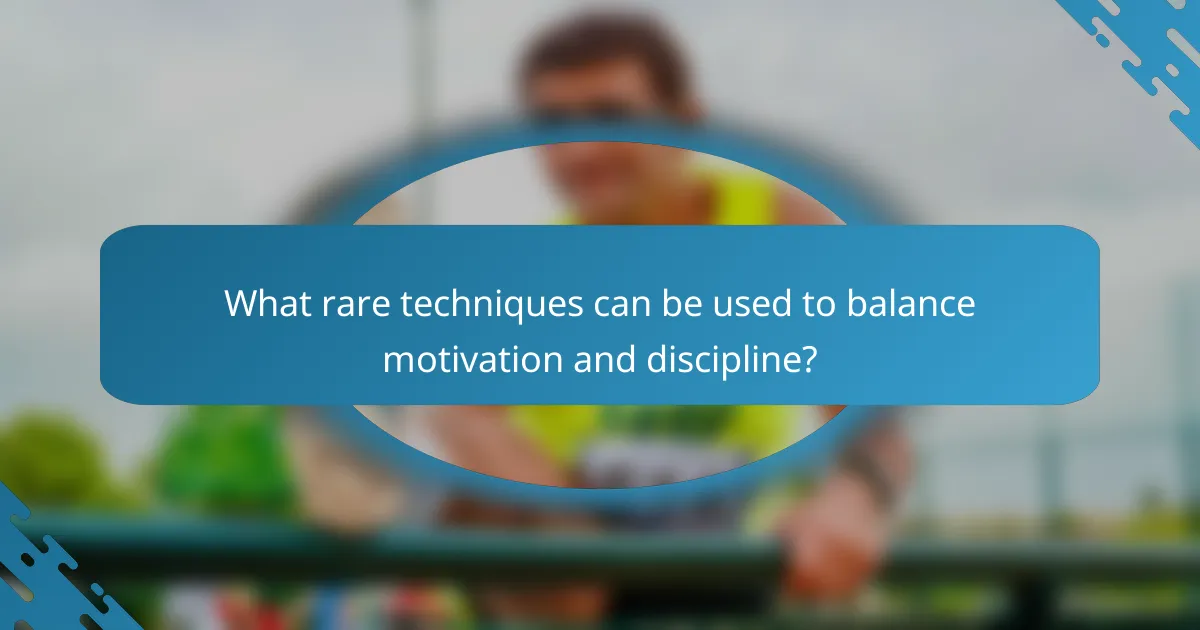
What rare techniques can be used to balance motivation and discipline?
To balance motivation and discipline, elderly individuals can use rare techniques such as mindfulness meditation, which enhances self-awareness and emotional regulation. Another technique is setting micro-goals, allowing for incremental achievements that reinforce discipline and boost motivation. Additionally, incorporating gamification elements into daily tasks can create a sense of playfulness, making discipline feel less burdensome. Lastly, peer accountability groups can provide social support, making it easier to maintain motivation while adhering to disciplined routines.
How can mindfulness practices be integrated into mental health support?
Mindfulness practices can enhance mental health support for the elderly by promoting emotional regulation and reducing anxiety. Integrating mindfulness involves structured programs, such as guided meditation or breathing exercises, tailored to their cognitive abilities. Regular practice can improve focus and resilience, fostering a sense of community among participants. Research indicates that mindfulness can lead to a 30% reduction in symptoms of depression among older adults, highlighting its effectiveness. By incorporating these practices into mental health support, caregivers can provide valuable tools for improving overall well-being.
What specific mindfulness exercises are beneficial for seniors?
Mindfulness exercises beneficial for seniors include meditation, deep breathing, gentle yoga, and guided imagery. These practices enhance mental clarity, reduce stress, and improve emotional well-being. Regular engagement fosters a unique attribute of mindfulness: increased resilience in coping with age-related challenges.
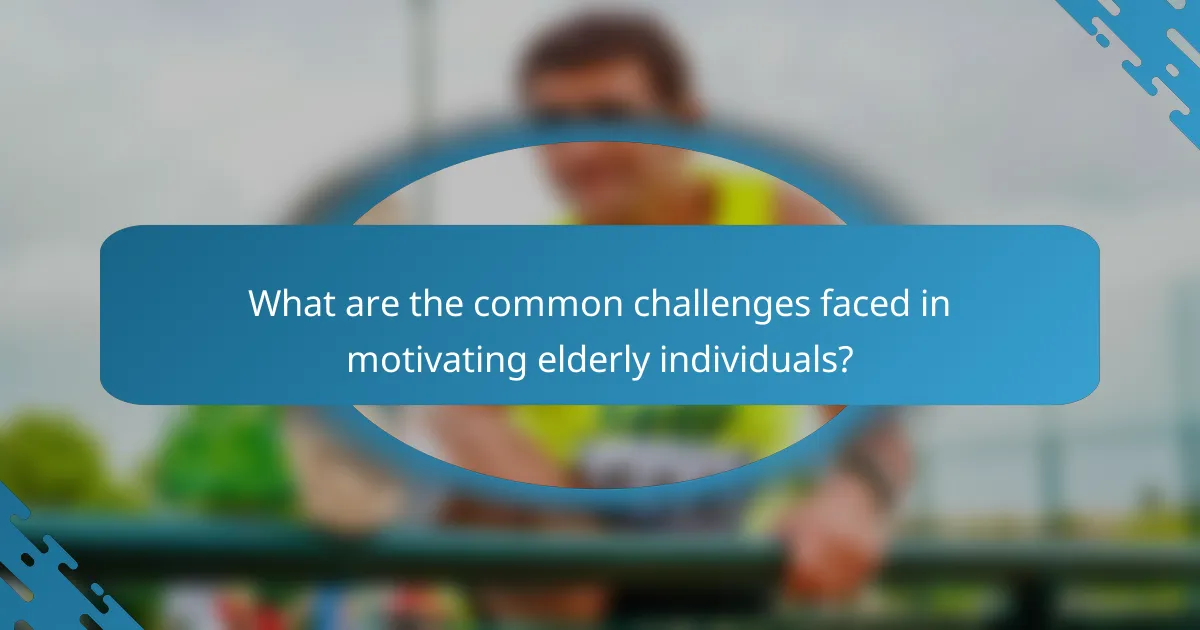
What are the common challenges faced in motivating elderly individuals?
Common challenges in motivating elderly individuals include physical limitations, cognitive decline, lack of social engagement, and emotional barriers. These factors can hinder their ability to pursue interests and maintain mental health. Addressing these challenges requires tailored strategies that enhance motivation through social support, accessible activities, and mental health resources. For instance, engaging elderly individuals in group activities can foster a sense of belonging and purpose, which is vital for their overall well-being.
How can caregivers effectively address resistance to motivation?
Caregivers can effectively address resistance to motivation by employing empathetic communication and personalized goal-setting. Understanding individual preferences enhances engagement and fosters a supportive environment. Encouraging small achievements can build confidence, making motivation more attainable. Additionally, involving seniors in decision-making promotes a sense of agency, reducing resistance.
What support systems are available for elderly individuals struggling with discipline?
Elderly individuals struggling with discipline can access various support systems, including community programs, counseling, and peer support groups. These resources enhance motivation and promote mental health. Community centers often offer structured activities that foster social interaction and accountability. Professional counseling provides tailored strategies to improve self-discipline. Additionally, peer support groups create a sense of belonging, encouraging individuals to share experiences and motivate each other.
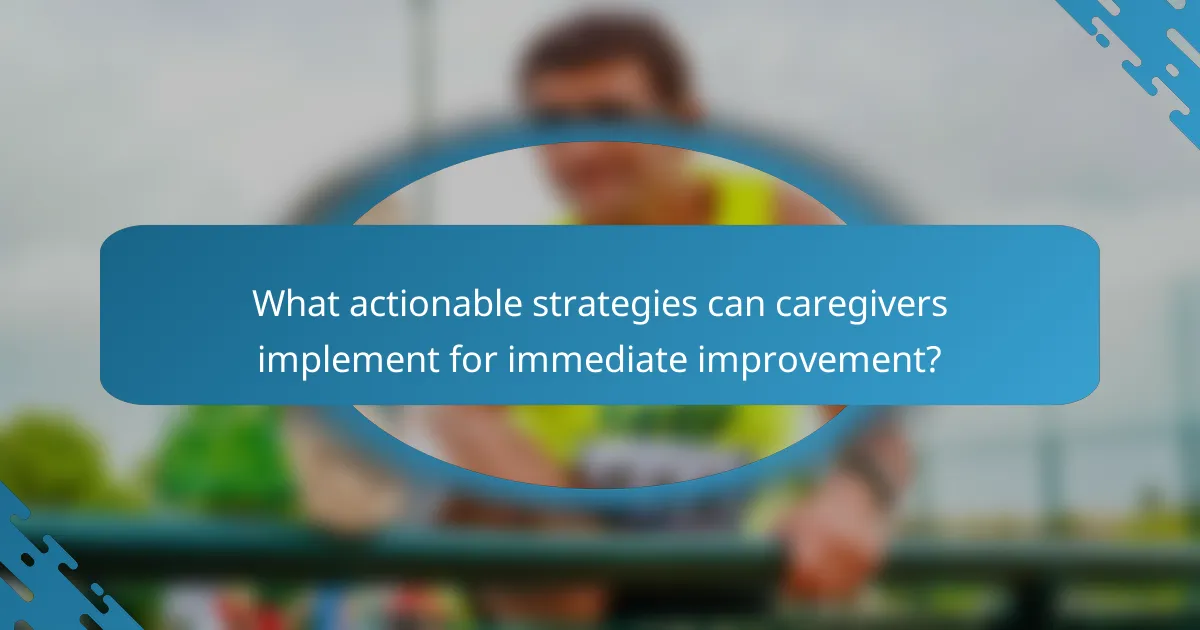
What actionable strategies can caregivers implement for immediate improvement?
Caregivers can implement strategies such as fostering social connections and establishing routines to enhance elderly mental health support. These methods promote motivation and discipline, leading to immediate improvements.
Encouraging regular social interactions helps combat loneliness, a common issue among the elderly. Activities like group games or community events can stimulate engagement.
Establishing daily routines provides structure, which can reduce anxiety and improve overall mental well-being. Consistent schedules for meals, exercise, and relaxation create a sense of stability.
Incorporating mental exercises, such as puzzles or memory games, can also enhance cognitive function. These activities motivate seniors to stay mentally active, supporting their mental health.
Lastly, caregivers should actively listen and validate the feelings of elderly individuals. This practice fosters trust and encourages open communication, further enhancing the support provided.
How can daily check-ins enhance motivation and discipline?
Daily check-ins can significantly enhance motivation and discipline by fostering accountability and providing structure. Regular interactions create a supportive environment where individuals feel encouraged to share their goals and progress. This practice can lead to improved mental health among the elderly by promoting a sense of purpose and routine. Establishing a consistent check-in schedule reinforces commitment to personal objectives, ultimately enhancing overall well-being.
What are the best practices for fostering a supportive environment?
To foster a supportive environment for enhancing elderly mental health, prioritize empathy, active listening, and community engagement. Create safe spaces for open dialogue, ensuring that elderly individuals feel valued and heard. Encourage social interactions through group activities, promoting a sense of belonging. Regularly assess the mental health needs of the elderly, tailoring support strategies accordingly. Establish routine check-ins to monitor emotional well-being, fostering trust and connection.
What common mistakes should be avoided in elderly mental health support?
To enhance elderly mental health support, avoid common mistakes such as neglecting individualized care, overlooking social engagement, and failing to recognize signs of depression. These errors can undermine motivation and discipline in mental health strategies. Prioritize personalized approaches, foster community connections, and stay vigilant for emotional changes to improve overall well-being.